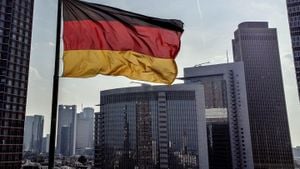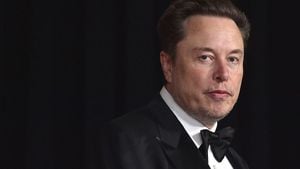BRUSSELS — Mark Rutte, the recently appointed NATO Secretary-General, made headlines on Thursday with his stark warning about the looming threat Russia poses to Europe. Addressing attendees at the Carnegie Europe think tank, Rutte stated bluntly, "Putin wants to wipe Ukraine off the map," and cautioned this brutality might extend to other regions on the continent. This marked Rutte's first significant speech since assuming office, and he didn’t hold back his concern.
During his speech, Rutte emphasized the need for preparedness, declaring, "It is time to shift to a wartime mindset." He stressed the gravity of the situation, saying, "We must confront the reality of Russian aggression head-on." His remarks come amid heightened tensions following Russia's military actions, particularly its war efforts against Ukraine. Rutte pointed out the alarming statistic: Russia is allocating nearly 7-8% of its GDP to defense purposes. This figure stands as a clear signal of President Putin's intentions to expand his military capabilities and assert control over neighboring territories.
Rutte's call for increased defense funding isn’t merely theoretical. He mentioned the prospect of European nations needing to allocate "a lot more than the NATO target of 2%" of their GDP to defense. This recommendation reflects not only the immediate geopolitical concerns but also the long-term viability of NATO's collective defense strategy against Russian ambitions. "We must fortify our resources and capabilities to effectively counteract any attempts to undermine our freedom and democratic values," Rutte implored.
Meanwhile, as these calls for action are being made, there’s acknowledgment within NATO about the precarious position NATO allies find themselves. A plethora of European countries are grappling with their defense budgets, many of which still hover below the 2% mark. This underfunding has raised eyebrows and questions about how serious member nations are about deterring Russian advances.
Looking backward, it's important to recognize the shifts past military engagements and setbacks have brought to Russia’s strategy. Rutte highlighted another concern: observed discrepancies within Russia’s military effectiveness, particularly noting Vladimir Putin’s recent public struggles—most glaringly the alleged failures to maintain his hold over Syria. After attempting to back Bashar al-Assad's regime, Russia’s inability to assert itself effectively there has led to what some analysts call "a stunning blow" to Putin’s aspirations to reshape Russia as a dominant global power on par with the United States.
This perceived humiliation for Putin could be fueling his aggressive posturing closer to home, pushing NATO leaders to confront the grim possibilities. The Secretary-General indicated intent to rally support for NATO’s goals by urging member states to not only meet but exceed current military spending benchmarks. Rutte, known for his strategic communication skills, was cast as NATO’s new leader partly due to his ability to engage with national leaders and maintain cohesion within alliances.
Interestingly, amid Rutte's warnings, there have been discussions around U.S. involvement. The Biden administration has been urged to affirm its role within NATO, particularly with President-elect Donald Trump’s controversial statements about potentially withdrawing U.S. military support if allies fail to "pay their bills" or "treat us fairly." How this will play out remains uncertain, yet Rutte's emphasis on ramping up European defense spending is intended to preempt any future reliance on U.S. policy changes.
There are growing calls within Europe for stronger military ties and cooperative defense strategies. Rutte's poignant message serves as both a wake-up call and rallying cry for action. European leaders are urged not only to address current threats but also to prepare for potential shifts in global power dynamics spurred by Russia’s continued aggression.
But what does this all mean for ordinary Europeans? If Rutte's warnings resonate, it could lead to increased military presence on European soil and heightened public awareness about security issues. Some may welcome increased defense efforts as necessary for safeguarding national interests, but others may raise concerns about the potential for spiraling military engagements or the economic burdens associated with increased spending.
And, there’s more. There's also the implication of this rhetoric on civilian life, creating stark perceptions of daily safety. There’s no denying the apprehension stemming from Russia's military undertakings, impacting everything from international relations to trade agreements.
Rutte’s statements ring as both urgent and pivotal. By galvanizing support for increased military preparedness, he aims to deter Putin’s aims and reinforce NATO’s foundational principles of collective defense. If European nations fail to take heed, the consequences could be dire.
Only time will tell how these calls to action will be received and implemented, but the clock is ticking. Will Europe respond with the seriousness such threats demand, or will complacency once again overshadow the urgency of defensive measures? Only time and the decisions made over the coming months will tell.



